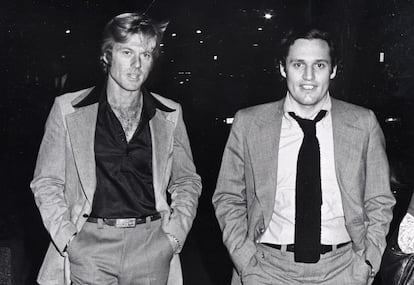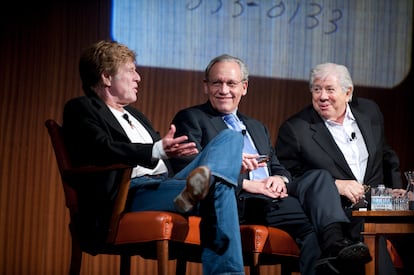'All the President's Men': Robert Redford and the Need for Journalism

A didactic exposition of ideas, conjectures, or hypotheses based on verified current events—not necessarily those of the day—that are reflected in the text itself. It excludes value judgments and is closer to the opinion genre, but differs from it in that it does not judge or predict, but only formulates hypotheses, offers reasoned explanations, and connects disparate data.

In a delightful piece on Venice , American journalist Rachel Donadio reproduced a dialogue between two tourists about to set out for a walk in the Italian city. One said, "What do you think if we spend the whole day getting lost in Venice ?" And the other replied, "As if we had any other choice." Something similar happens with Alan J. Pakula 's film All the President's Men , in which Robert Redford, the great actor who died this Tuesday at the age of 89 , played Bob Woodward , one of the two Washington Post journalists who investigated the Watergate scandal . I don't think I know anyone who hasn't ended up confused by the film's intricate plot, despite the script being by William Goldman .
But, as with Venice, it's part of the journey, in this case, to one of the pinnacles of 20th-century journalism, a place to which it's more important than ever to return in these times. Watergate tells, at its core, the story of how journalism can curb abuses of power. In All the President's Men, there comes a point in the plot where it's impossible to understand the names that appear throughout the investigation, but Pakula—and Goldman, and some fabulous actors—manage to keep the viewer engaged despite getting lost in the fine print.
Many professionals rightly consider All the President's Men to be the best film about journalism (and one of the most vocations it has awakened along with Manu Leguineche's book The Shortest Way ) because it tells the boring epic of trying to verify a news story step by step and the difficulty of complying with one of the highest axioms of this profession: go where the facts lead us.
Redford plays the orderly and tidy Woodward and Dustin Hoffman plays the chaotic Bernstein, who smokes even in elevators. The two, led by a fabulous editorial team headed by Ben Bradlee , turned a robbery at the Democratic Party headquarters in Washington into a prodigious investigation that lasted two years and ended with the resignation of President Richard Nixon . An absolute triumph of journalism achieved by two novice professionals (Woodward was then 29 years old and Bernstein, 28) with tenacity, some help ( Deep Throat , the anonymous source par excellence), the courage of the management team and, above all, of the newspaper's owner, Katharine Graham .

Between the break-in at the Watergate building—which gave the case its name—on June 17, 1972, and the most famous front page in the history of journalism ("Nixon Resigns" in five columns) on Friday, August 9, 1974, Woodward and Bernstein were able to unravel a web of lies, corruption, and abuse of power. The film was shot in 1976, when the Watergate scandal was still part of the nation's living memory. It's almost a documentary.
In A Newspaper's Life , Ben Bradlee recounts that it all started very quickly. “Shortly after Nixon's resignation, Woodward came into my office and said, 'Robert Redford is in town,' and asked if I'd like to meet him. That's how I learned the film was in the works,” he writes in his memoir, a great book on journalism. “I found Redford to be a charming and very professional man. What he wanted to do scared us all a little. At first, he wanted to use the name of the newspaper. Without knowing who was co-producing the film, without knowing the script or the cast or who was going to direct, we said no. And he also wanted to shoot in the newsroom.” This was the only thing Bradlee achieved—a replica of the newspaper was built in Los Angeles—but the name of the newspaper and the real names of the protagonists were used, something the director didn't want.
Robert Redford. I loved him, and admired him—for his friendship, his fiery independence, and the way he used any platform he had to help make the world better, fairer, brighter for others. pic.twitter.com/Omg433DA3y
— Bob Woodward (@realBobWoodward) September 16, 2025
Bradlee confesses that he never suspected how important the film would be, nor that generations of viewers would learn the story of Watergate through a film that quickly became a classic. One of the many things American society owes to Robert Redford is having kept alive the memory of that David-versus-Goliath fight that, for once, David won…
Redford and Woodward maintained a close friendship and shared concerns about the authoritarian drift of the United States under President Donald Trump. On the same day of the actor's death, it was revealed that he had sued The New York Times for a fortune in an attempt to silence the newspaper . The journalist bid farewell to his old friend on Tuesday night with a letter he shared on Twitter. "On New Year's Eve 2021, Redford said he had rewatched All the President's Men a few days earlier. 'I was struck by how appropriate it was, how timely it was, and how little has actually changed. We don't have Nixon anymore, we have Trump.'" Years pass, and All the President's Men remains. And the journalism it embodies is more important than ever.
EL PAÍS





